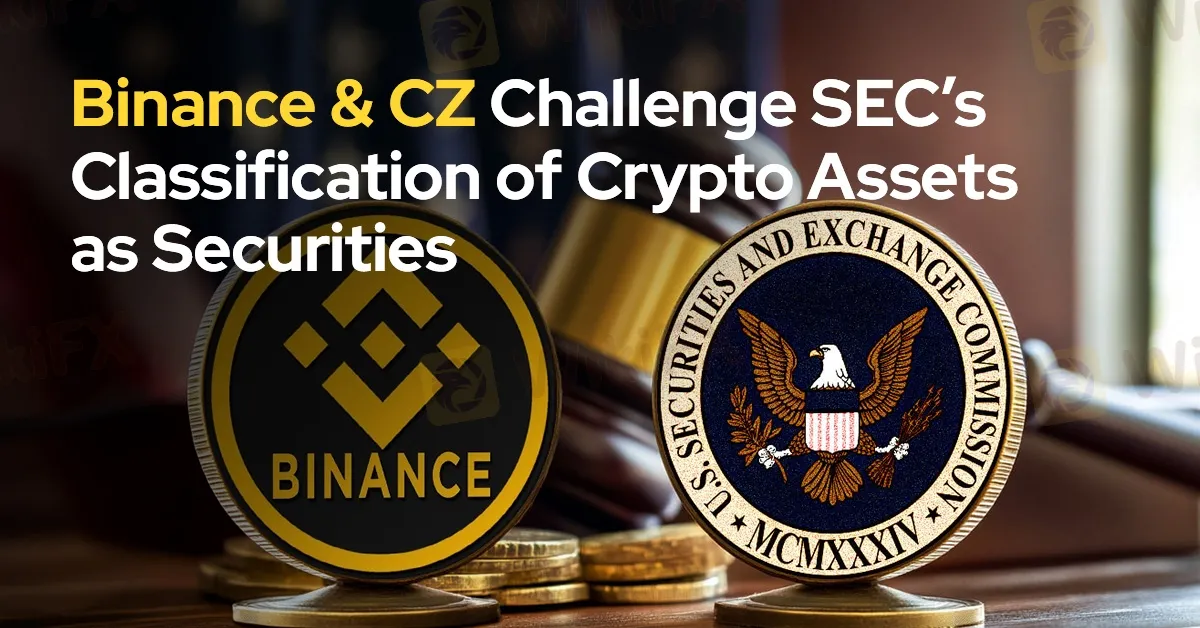简体中文
繁體中文
English
Pусский
日本語
ภาษาไทย
Tiếng Việt
Bahasa Indonesia
Español
हिन्दी
Filippiiniläinen
Français
Deutsch
Português
Türkçe
한국어
العربية
Binance & CZ Challenge SEC’s Classification of Crypto Assets as Securities
Abstract:In a November 4 filing, legal representatives for Binance and its CEO Changpeng Zhao (CZ) contested the Securities and Exchange Commission’s (SEC) amended complaint, asserting that the SEC merely pays “lip service” to a court ruling that excludes crypto assets from the definition of securities. The lawyers argue that despite this ruling, the SEC has continued to disregard its implications on digital asset trading

In a November 4 filing, legal representatives for Binance and its CEO Changpeng Zhao (CZ) contested the Securities and Exchange Commissions (SEC) amended complaint, asserting that the SEC merely pays “lip service” to a court ruling that excludes crypto assets from the definition of securities. The lawyers argue that despite this ruling, the SEC has continued to disregard its implications on digital asset trading.
The court previously determined that cryptocurrencies do not qualify as securities, implying that secondary market resales of these assets should not be classified as securities transactions. However, Binance‘s legal team contends that the SEC’s amended complaint persists in labelling nearly all crypto transactions—including secondary market resales of tokens—as securities transactions. This stance is based on the premise that some investors might anticipate an increase in asset value.
Furthermore, the filing highlights that the SECs amended complaint fails to provide a clear legal distinction between assets and investment contracts. The lawyers argue that assets should not be deemed investment contracts merely because they are presented to customers within a framework of promises and expectations. They emphasize that the SEC has not established definitive standards to guide courts, litigants, or market participants in determining which digital asset transactions qualify as investment contracts.
Binances attorneys also criticize the SEC for what they describe as arbitrary decision-making, referencing a recently abandoned case where Ether transactions were initially classified as investment contracts. The legal team points out that the SEC has acknowledged its own inability to differentiate securities from non-securities like Beanie Babies at the pleading stage.

The document further elaborates on the arguments against the SEC‘s cases involving Binance and CZ, ultimately requesting the dismissal of the SEC’s claims without allowing for any amendments. This follows an amended complaint filed by the SEC in September, where the agency clarified that it did not intend to label cryptocurrencies and tokens as securities outright. The SEC admitted to using the term “securities” as a broad reference to various aspects of crypto sales and later committed to using the term “crypto asset securities,” apologizing for any resulting confusion.
The legal battle dates back to June 5, 2023, when the SEC filed a lawsuit against Binance, CZ, and several affiliated companies for allegedly violating securities trading regulations. The SEC based its allegations on a court document that recognized Binances BNB token and the BUSD stablecoin as securities. Binance is not alone in facing such legal challenges; the SEC has also filed lawsuits against other major crypto entities like Coinbase and Ripple, accusing them of offering unregistered crypto asset securities.
As the dispute continues, the outcome of Binance and CZs legal efforts could have significant implications for the broader cryptocurrency market and the regulatory framework governing digital assets.

Disclaimer:
The views in this article only represent the author's personal views, and do not constitute investment advice on this platform. This platform does not guarantee the accuracy, completeness and timeliness of the information in the article, and will not be liable for any loss caused by the use of or reliance on the information in the article.
Read more

How Crypto Trading Transforms FX and CFD Brokerage Industry
Explore how crypto trading reshapes FX and CFD brokerage with innovative products, liquidity solutions, and regulations in 2025.

Why More People Are Trading Online Today?
Discover why online trading is booming with tech, AI, and a push for financial freedom. From stocks to crypto, it’s a thrilling hustle for all.

SEC Ends Crypto.com Probe, No Action Taken by Regulator
The SEC has closed its investigation into Crypto.com with no action taken. Crypto.com celebrates regulatory clarity and renewed momentum for the crypto industry.

Interactive Brokers Expands Crypto Trading with Solana, XRP, Cardano, and Dogecoin
Interactive Brokers adds Solana, XRP, Cardano, and Dogecoin to its platform, enabling U.S. and U.K. clients to trade crypto 24/7 with low fees.
WikiFX Broker
Latest News
Interactive Brokers Expands Crypto Trading with Solana, XRP, Cardano, and Dogecoin
Fidelity Investments Explores Stablecoin Innovation in Digital Assets Sector
Why More People Are Trading Online Today?
SEC Ends Crypto.com Probe, No Action Taken by Regulator
How Crypto Trading Transforms FX and CFD Brokerage Industry
UK would not hesitate to retaliate against US tariffs - No 10 sources
Gold Surges to New Highs – Is It Time to Buy?
Bitpanda Secures Full Broker-Dealer License in Dubai
Lost Money to Scam Recently?! This Article Could Help You!
Navigating the Intersection of Forex Markets, AI Technology, and Fintech
Currency Calculator







